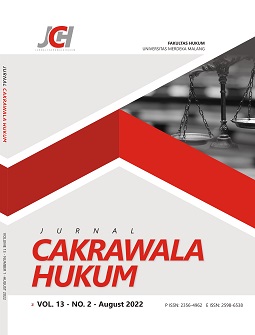The social work criminal law policy reduces the overcapacity of correctional institutions
DOI:
https://doi.org/10.26905/idjch.v13i3.6512Keywords:
Criminal Law, Social Work, Correctional Institution.Abstract
This study discusses the imposition of a sentence against a person who commits a crime which is a very important part of realizing a good criminal justice system, in this case, the judge must be able to choose the right type of punishment for the perpetrator. The alternative to imprisonment, in this case, social work punishment, provides for the fact that prison sentences are increasingly being criticized due to humanitarian considerations, philosophical considerations, and economic considerations. Criticism of the negative consequences of imprisonment has given rise to thoughts of looking for an alternative to imprisonment, even though imprisonment can be justified in terms of crime prevention and public safety. Social work criminal acts for perpetrators of minor crimes can fulfill elements of development and provide protection to society. Guidance elements that are oriented toward individual criminal offenders who are convicted of social work offenders are protected from negative impacts such as being labeled as offenders by society and loss of self-confidence.
How to cite item:Â
Saputra, R. (2022). The social work criminal law policy reduces the overcapacity of correctional institutions. Jurnal Cakrawala Hukum, 13(3), 308-315. DOI:https://doi.org/10.26905/idjch.v13i3.6512.References
Alin, F. (2017). Sistem Pidana dan Pemidanaan di dalam Pembaharuan Hukum Pidana Indonesia. JCH (Jurnal Cendekia Hukum), 3(1), 14-31. Available at: http://e-jurnal.stih-pm.ac.id/index.php/cendekeahukum/article/view/6/14.
Djamali, Abdul. (2009). Introduction to Indonesian Law. Jakarta: Eagle Press.
Effendi, E. (2019). Relations between Corruption Crimes and the Welfare State. Malaynesian Law, 3(2), 166-180.
Effendi, Erdianto. (2011). Indonesian Criminal Law: An Introduction. Bandung: Andita's reflection.
Fajri, A. (2020). Pidana Kerja Sosial Dalam Membatasi Kelebihan Penghuni Di Lembaga Pemasyarakatan. Lex Renaissance, 4(1), 46–64. DOI: https://doi.org/10.20885/JLR.vol4.iss1.art3.
Igo, M. (2022). KEBIJAKAN FORMULASI DALAM RUU KUHP TERHADAP PIDANA KERJA SOSIAL SEBAGAI ALTERNATIF PIDANA PENJARA. JURNAL EDUCATION AND DEVELOPMENT, 10(2), 707-713. http://journal.ipts.ac.id/index.php/ED/article/view/3897.
Islamy, Y., Rusmiati, E., & Chandra, E. M. (2019). Analisis Pelaksanaan Pidana Kerja Sosial Berdasarkan Rkuhp. Dih: Jurnal Ilmu Hukum, 18(1), 374370. DOI: https://doi.org/10.30996/dih.v0i0.5349.
Judge, Luke. (2020). Implementation and Implementation of Punishment Objectives in RKUHP and RKUHAP. Yogyakarta: Main Buddha.
Mertukusumo, Sudikno. (2017). Legal theory. Yogyakarta: The Atmic Light of Heritage.
Mulyono, G. P., & Arief, B. N. (2016). UPAYA MENGURANGI KEPADATAN NARAPIDANA DALAM LEMBAGA PEMASYARAKATAN DI INDONESIA. LAW REFORM, 12(1), 1-16. DOI: https://doi.org/10.14710/lr.v12i1.15838.
Perkasa, R. A. P. (2020). Optimalisasi Pembinaan Narapidana dalam Upaya Mengurangi Overcapacity Lembaga Pemasyarakatan. Wajah Hukum, 4(1), 108-115. DOI: http://dx.doi.org/10.33087/wjh.v4i1.175.
Ridwan, Syahrani. (2014). Summary of the Digest of Law Studies Revised Edition. Bandung: Image Aditya Bakti.
Saputra, A. O., Mahardika, S. E., & Pujiyono, P. (2021). Kebijakan Hukum Pidana Dalam Upaya Penanggulangan Tindak Pidana Untuk Mengurangi Overcrowded Lembaga Pemasyarakatan Pada Masa Pandemi Covid-19. Jurnal USM Law Review, 4(1), 326-342. Avaluibel at: https://journals.usm.ac.id/index.php/julr/article/view/3230/2084.
Setiady, Tolib. (2010). Fundamentals of Indonesian Penitentiary Law. Bandung: Alphabet.
Situmeang, S. M. T., Pane, M. D., & Wahyudi, W. (2020). Optimizing the Role of Law Enforcement in Implementing Criminal Social Work and Compensation to Realize the Goals of an Equitable Punishment. Journal of Law IUS QUIA IUSTUM, 27(3), 501-525.
Soekanto, Soedjono. (2005). Introduction to law. Jakarta: King Gravindo Persada.
Sudarto. (1984). Criminal Law And Community Development. Bandung: New Light.
Sugiharto, G. (2016). Policy Relevance of Social Work Criminal Determination in the Penal System in Indonesia. Novelty Law Science Journal, 7 (1).
Stick. (2001). Criminal Social Work in the Reform of Indonesian Criminal Law. Jakarta: Bridge.
Usman, U., Nasution, B. J., & Seregar, E. (2020). Over Kapasitas Lembaga Pemasyarakatan Dalam Perespektif Kebijakan Hukum Pidana. Wajah Hukum, 4 (2), 436-444. DOI: http://dx.doi.org/10.33087/wjh.v4i2.256.
Westlaw Classic. (2016). Civil Rights, United States Court of Appeals, Sixth Circuit, Social workers have qualified immunity, Kirkpatrick v. County of Washoe.
Wibowo, M. H. (2018). Corporate Responsibility in Money Laundering Crime (Perspective Criminal Law Policy in Crime of Corruption in Indonesia). Journal of Indonesian Legal Studies, 3(2), 213. DOI: 10.15294/jils.v3i02.22740.
Downloads
Published
How to Cite
Issue
Section
License
Authors who publish in this journal agree to the following terms:
The copyright of the received article shall be assigned to the journal as the publisher of the journal. The intended copyright includes the right to publish the article in various forms (including reprints). The journal maintains the publishing rights to the published articles. Authors must agree to the copyright transfer agreement by checking the Copyright Notice column at the initial stage when submitting the article.





